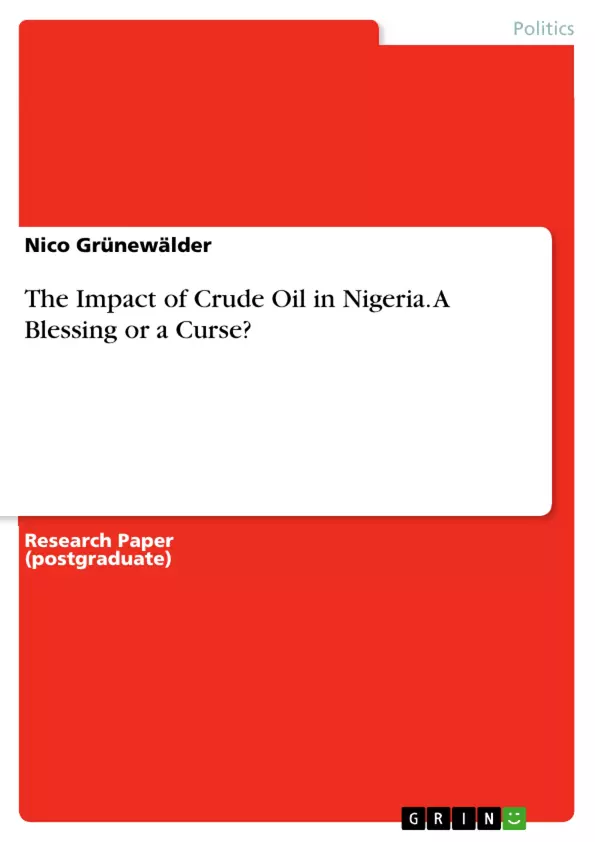How did crude oil affect the economic growth and the poverty of Nigeria? This paper is going to analyze effect of crude oil on the Nigerian economy. We examine the correlation between fuel exports and GDP per capita growth, and poverty headcount ratio between 1960 and 2012.
Since the discovery of crude oil in Nigeria the economy of Nigeria has improved, increasing the GDP through the sales of oil barrels abroad. The paper observes that the blessings from crude oil resource in Nigeria at large takes the form of increased government revenues, increased export earnings, the attendant improvement, opportunities and linkage effects in the economy.
However the paper is majorly going to focus on the variables between the increased GDP and the increase poverty level. This paper is of the view that crude oil resource is more of curse than a blessing to the Nigerian economy.
Inhaltsverzeichnis (Table of Contents)
- Abstract
- Introduction
- Literature Review
- Data Analysis
- Conclusion
- Appendix
- References
Zielsetzung und Themenschwerpunkte (Objectives and Key Themes)
This paper investigates the impact of crude oil on Nigeria's economy, examining whether it has been a blessing or a curse for the country. While oil discovery has increased Nigeria's GDP through exports, it has also been linked to high poverty rates. The paper explores the complex relationship between oil revenue, economic growth, and poverty levels in Nigeria.
- Impact of crude oil on the Nigerian economy
- Relationship between oil revenues, GDP growth, and poverty levels
- Influence of oil dependency on economic stability and development
- Consequences of corruption and mismanagement in the oil sector
- Potential for reform and alternative economic development strategies
Zusammenfassung der Kapitel (Chapter Summaries)
- Abstract: This paper examines the question of whether crude oil is a blessing or a curse for Nigeria. It explores the positive and negative impacts of oil on the economy, focusing specifically on the relationship between GDP growth and poverty levels.
- Introduction: The paper traces the history of oil exploration and exploitation in Nigeria, highlighting the initial economic benefits. However, it raises the paradox of increasing GDP alongside high poverty rates, leading to the central question of the paper: how has crude oil affected Nigeria's economic growth and poverty?
- Literature Review: This chapter examines existing research on the impact of oil dependency on developing countries. It highlights the common challenges associated with oil-rich nations, including economic instability, suppression of other sectors, inequality, civil conflict, and corruption.
- Data Analysis: Using data from the World Bank, this section explores the correlation between fuel exports growth and GDP per capita growth in Nigeria between 1960 and 2012. It investigates the relationship between these indicators and poverty levels, presenting evidence of the paradox of increasing GDP despite rising poverty.
Schlüsselwörter (Keywords)
The paper focuses on the impact of crude oil on the Nigerian economy, analyzing the relationship between oil revenues, GDP growth, and poverty levels. Key themes include oil dependency, economic instability, corruption, mismanagement, and the need for economic diversification and reform.
- Arbeit zitieren
- Bachelor of Arts Nico Grünewälder (Autor:in), 2013, The Impact of Crude Oil in Nigeria. A Blessing or a Curse?, München, GRIN Verlag, https://www.grin.com/document/314354



